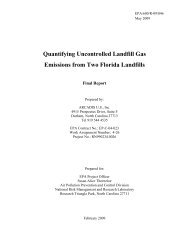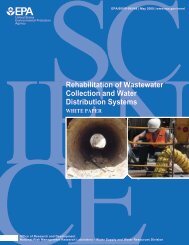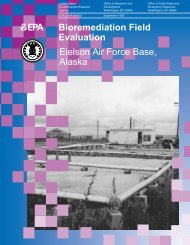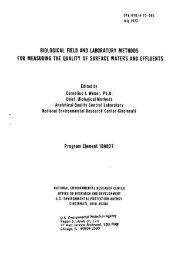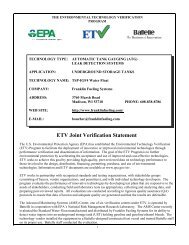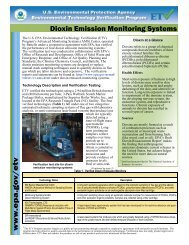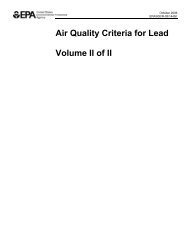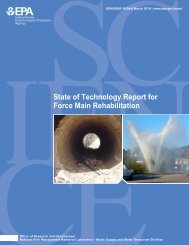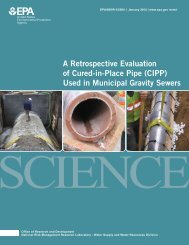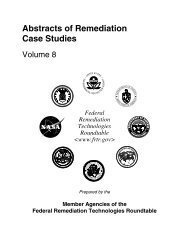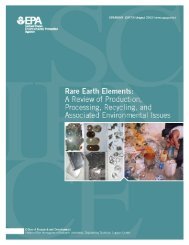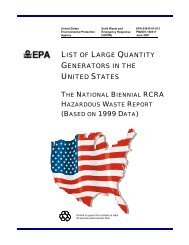Health Assessment Document for Diesel Emissions - NSCEP | US ...
Health Assessment Document for Diesel Emissions - NSCEP | US ...
Health Assessment Document for Diesel Emissions - NSCEP | US ...
You also want an ePaper? Increase the reach of your titles
YUMPU automatically turns print PDFs into web optimized ePapers that Google loves.
Study<br />
Ulfvarson et a!.<br />
(1987)<br />
Battigelli et a!.<br />
(1964)<br />
Gamble et a!.<br />
(1987b)<br />
Purdham et a!.<br />
(1987)<br />
Reger eta!. (1982)<br />
2/1198<br />
Table 5-1. Human studies of exposure to diesel exhaust (continued)<br />
Description<br />
W orkshift changes in<br />
pulmonary function were<br />
evaluated in crews of roll-on!<br />
roll-off ships and car ferries<br />
and bus garage staff.<br />
Pulmonary function was<br />
evaluated in six volunteers<br />
exposed to diluted diesel<br />
exhaust, 2.1 ppm N0 2 , and 0.6<br />
mg/m 3 particulate matter.<br />
Cross-sectional and longitudinal studies<br />
210 locomotive repairmen<br />
exposed to diesel exhaust <strong>for</strong> an<br />
average of9.6 years in railroad<br />
engine houses were compared<br />
with 154 railroad yard workers<br />
of comparable job status but no<br />
exposure to diesel exhaust.<br />
283 male diesel bus garage<br />
workers from four garages m<br />
two cities were examined <strong>for</strong><br />
impaired pulmonary function<br />
(FVC, FEV 1 , and flow rates).<br />
Study population with a mean<br />
tenure of9 ± 10 years S.D. was<br />
compared to a nonexposed<br />
blue-collar population.<br />
Respiratory symptoms and<br />
pulmonary function were<br />
evaluated in 17 stevedores<br />
exposed to both diesel and<br />
gasoline exhausts. in car ferry<br />
operations; control group was<br />
11 on-site office workers.<br />
Differences in respiratory<br />
symptoms and pulmonary<br />
function were assessed in<br />
823 coal miners from six<br />
diesel-equipped mines ,<br />
compared to 823 matched coal<br />
miners not exposed to diesel<br />
exhaust.<br />
Findings<br />
Pulmonary function was affected during a<br />
workshift exposure to diesel exhaust, but it<br />
normalized after a few days with no exposure.<br />
Decrements were greater with increasing intervals<br />
between exposures. No effect on pulmonary<br />
function was observed in the experimental<br />
exposure study.<br />
No significant differences in VC, FEV 1 , peak flow,<br />
nitrogen washout, or diffusion capacity or in the<br />
prevalence of dyspnea, cough, or sputum were<br />
found between the diesel exhaust-exposed and<br />
nonexposed groups.<br />
Analyses within the study population showed no<br />
association of respiratory symptoms with tenure.<br />
Reduced FEV 1 and FEF5 0 (but not FEF 75 ) were<br />
associated with increasing tenure. The study<br />
population had a higher incidence of cough,<br />
phlegm, and wheezing unrelated to tenure.<br />
Pulmonary function was not affected in the total<br />
cohort of diesel-exposed but was reduceq with 10<br />
or more years of tenure.<br />
No differences between the two groups <strong>for</strong> respiratory<br />
symptoms. Stevedores had lower baseline<br />
lung function consistent with an obstructive<br />
ventilatory defect compared with controls and<br />
those of Sydney, Nova Scotia, residents. Caution<br />
in interpretation is warranted due to small sample<br />
size. No significant changes in lung function over<br />
workshift or difference between two groups.<br />
Underground miners in diesel-use mines reported<br />
more symptoms of cough and phlegm and had<br />
lower pulmonary function. Similar trends were<br />
noted <strong>for</strong> surface workers at diesel-use mines.<br />
Pattern was consistent with small airway disease<br />
but factors other than exposure to diesel exhaust<br />
thought to be responsible.<br />
5-14 DRAFT --DO NOT CITE OR QUOTE



